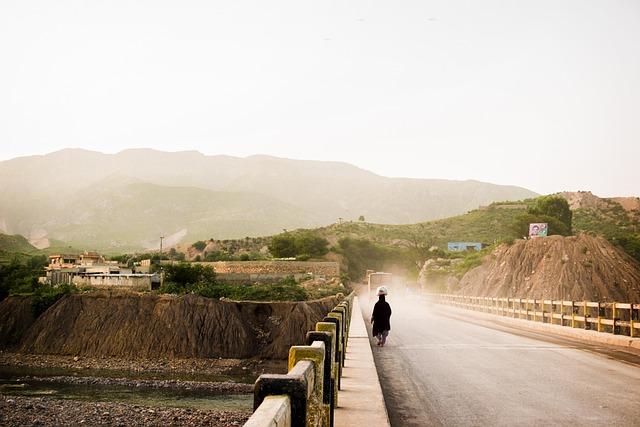In a world that often feels divided by lines on a map, the reality of human experience transcends borders, weaving a complex tapestry of social challenges that resonate across nations. Pakistan, a country of rich cultural heritage and breathtaking landscapes, stands at a crossroads where tradition meets modernity, and old challenges collide with new aspirations. From escalating inequality to the pressing demands of a burgeoning youth population, the social fabric of this vibrant nation is undergoing a profound transformation. In this exploration of “Beyond Borders: Unraveling Pakistan’s Social Challenges Today,” we delve into the multidimensional issues that shape the lives of millions, examining how they reflect not only local complexities but also global themes of community, resilience, and change. Join us on this journey to understand the pressing social narrative of Pakistan, where every challenge presents an opportunity for growth and unity in the face of adversity.
Exploring the Landscape of Inequality and Its Impact on Society
The socio-economic fabric of Pakistan is a complex tapestry woven with threads of tradition, culture, and stark disparities. Inequality is not merely a physical manifestation; it manifests in various forms, including educational accessibility, healthcare quality, and employment opportunities. As urban centers burgeon, rural areas often languish, highlighting a chasm that perpetuates poverty and marginalization. The urban-rural divide exacerbates issues such as inadequate infrastructure and a lack of job prospects, which in turn fuels a cycle of disenfranchisement. Key factors contributing to this inequality include:
- Educational Disparities: Access to quality education remains unequal, particularly for girls and marginalized communities.
- Healthcare Access: Rural populations often have limited access to healthcare facilities, leading to poorer health outcomes.
- Employment Opportunities: Job creation is largely concentrated in urban areas, leaving rural workers without viable employment options.
These layers of inequality not only hinder individual prosperity but also stymie societal progress. The fabric of community life is frayed as discontent and frustration brew among those left behind. For instance, in urban spaces like Karachi and Lahore, economic advancements are shadowed by sprawling informal settlements where residents struggle against systemic neglect. To illustrate this, the table below highlights the growth in urban poverty against the backdrop of rapid urbanization:
| Year | Urban Population (%) | Urban Poverty Rate (%) |
|---|---|---|
| 2000 | 30 | 25 |
| 2010 | 35 | 28 |
| 2020 | 40 | 33 |
As policymakers grapple with the challenges posed by this landscape of inequality, it is imperative to adopt a holistic approach that not only targets economic growth but fosters inclusive development. Bridging the gap requires not just immediate funding investments but long-term strategies aimed at empowering marginalized communities, ensuring equitable access to resources, and cultivating a sense of social cohesion essential for a prosperous nation.

Navigating the Complexities of Education and Youth Empowerment
The intricate relationship between education and youth empowerment in Pakistan is a tapestry woven with challenges and opportunities. In many regions, access to quality education remains a fundamental hurdle, exacerbated by socio-economic disparities and inadequate infrastructure. Numerous youths grapple with outdated curricula that do not meet the demands of the modern job market, while financial constraints often prevent families from supporting their children’s education. As a result, countless talented individuals are left adrift, their potential untapped in a landscape that demands a significant educational overhaul.
To navigate these complexities, holistic approaches that blend educational reforms with community empowerment initiatives are vital. Effective strategies may include:
- Leveraging technology to enhance learning opportunities and bridge educational gaps.
- Promoting vocational training programs tailored to local economic needs, fostering job readiness among the youth.
- Encouraging community involvement in educational processes to ensure that curricula resonate with societal values and challenges.
Furthermore, establishing partnerships between governmental bodies and non-profit organizations can amplify these efforts. By creating a robust support system, young individuals can be better equipped to navigate the hurdles ahead and contribute to a brighter future for themselves and their communities.

Addressing Health Disparities: A Path to Inclusive Well-being
Health disparities in Pakistan are deeply rooted in the country’s social fabric, influenced by factors such as socioeconomic status, geographic location, and cultural beliefs. Addressing these inequities requires a multi-faceted approach that acknowledges not only the health care system’s limitations but also the broader social determinants impacting health. Key areas to focus on include:
- Access to Quality Health Care: Ensuring that health facilities reach rural and marginalized communities.
- Education and Outreach: Increasing awareness about health issues through targeted campaigns.
- Empowerment of Vulnerable Groups: Promoting inclusion of women, children, and minorities in health initiatives.
The disparity in health outcomes can be illustrated through data that highlights the unequal distribution of resources and opportunities. For instance, areas with higher poverty rates often exhibit worse health metrics compared to more affluent regions. Addressing these disparities may involve collaboration between government, NGOs, and community organizations to create sustainable solutions. The following table provides a snapshot of key health indicators across different economic strata:
| Economic Status | Infant Mortality Rate (per 1,000 live births) | Literate Adult Population (%) | Access to Clean Water (%) |
|---|---|---|---|
| High Income | 25 | 95 | 98 |
| Middle Income | 44 | 80 | 85 |
| Low Income | 78 | 60 | 65 |

Fostering Social Cohesion Through Community Engagement and Dialogue
Community engagement is pivotal in addressing the complex social challenges faced across Pakistan. By bringing together individuals from diverse backgrounds, communities can create a tapestry of shared experiences and aspirations. Through dialogue and collaboration, we can:
- Identify common goals and values
- Encourage participation from marginalized groups
- Strengthen trust and mutual respect among community members
Initiatives that promote active dialogue serve as a conduit for fostering understanding and empathy, which are crucial for social cohesion. Potential strategies to enhance community engagement include:
- Organizing workshops and forums that invite varying perspectives
- Creating platforms for storytelling that highlight personal narratives
- Establishing collaborative projects that solve local issues
| Strategy | Description |
|---|---|
| Workshops | Interactive sessions promoting skills and knowledge sharing. |
| Community Forums | Open discussions addressing local concerns and solutions. |
| Collaborative Art Projects | Art as a medium for expression and connection within the community. |
Wrapping Up
As we draw the curtains on our exploration of Pakistan’s social challenges, it becomes evident that the journey through these complexities is far from over. Beyond borders, beyond narratives, lies a tapestry woven with stories of resilience and aspiration. Each challenge unveils a facet of the human experience, echoing the hopes and endeavors of countless individuals striving for a more equitable society.
The struggle for social justice, gender equality, and economic opportunity highlights both the hurdles faced and the strides made. In reflective moments, we are reminded that societal progress is seldom linear; it ebbs and flows like the rivers that cradle this vibrant land. The challenges posed by tradition, inequality, and structural barriers serve as catalysts for dialogue and action, urging us to rethink our approaches and foster a spirit of collaboration.
As we continue to unravel these intricate threads, let us engage with empathy, challenge the status quo, and envision a future where the potential of every citizen is recognized and empowered. The journey does not end here; it evolves with every discussion, every initiative, and every act of kindness that refuses to succumb to despair. Together, we can build bridges—both within Pakistan and beyond—cultivating a deeper understanding of its rich tapestry of social realities. The call to action is clear; let us be advocates for change, as we navigate the complexities of a society in transformation.



